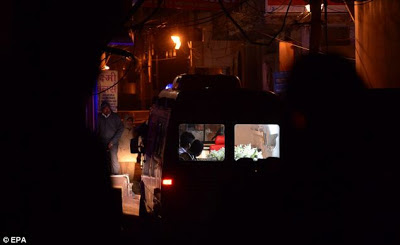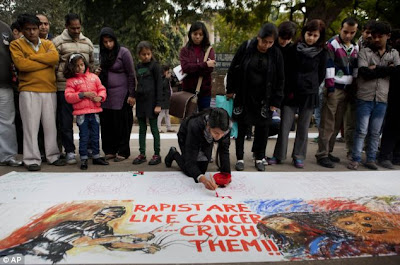 |
| Protests in New Delhi |
Has it started at last?
Has the devastatingly poignant
death of the “India Gang-Rape” young woman dubbed “Nirbhaya” -- or fearless one -- let the rape genie out of the bottle in India and
other countries around the world?
Is 2013 the year when rapists
are punished rather than their victims? Will it be the year when governments,
politicians and people join together to abolish this beastly act?
I certainly hope so, and
not only in India.
One Indian woman was inspired
by the recent gang rape death to speak out.
 |
| Sonika Bhasin's tweets |
Sonika Bhasin, @sonikabhasin wrote
December 29 on Twitter: “Have decided, I am going to call out the guy who
abused me when I was just 13. My friend's father, my dad's friend. I'm going to
tell everyone.”
Sonika, a media
professional from Mumbai, so rightly added: “It's going to take a lot of
courage and strength, but I will do it. And I wish all girls do, so that sexual
abusers don't get away.”
I am of course talking
about the student gang-raped and brutally beaten on a bus in India's capital New
Delhi on the night of December 16. The Times of India refers to the woman,
whose name has not been released to the public, as “Nirbhaya,” or the fearless
one.
 |
| Nirbhaya's body beings its sad journey home from Singapore |
 |
| Lilies surround Nirbhaya's body in the ambulanceas it is driven home in Delhi |
She died on Saturday,
December 29, at a Singapore hospital where she was airlifted two days earlier,
after three operations in a Delhi hospital. She had suffered from severe
organ failure following serious injuries to her body.
There are mounting appeals to the family to release her name, allowing
the general public to honor and remember her.
The
23-year-old trainee physiotherapist was with her boyfriend, who she was due to
marry in February. They had just been to see the blockbuster movie “The Life of
Pi. They
were attacked when they boarded a bus in the Munirka area of
Delhi, intending to travel to Dwarka in the city’s southwest.
Police
said men on the bus gang-raped the woman for nearly an hour and beat her and
her male companion with iron rods as the bus, with curtains shut, drove through
the city for hours, even passing through police checkpoints. The assailants
eventually stripped the pair and dumped them on the side of a road.
 |
| "Rapist are like cancer, crush them!!" sign on the streets of Delhi |
 |
| Protesters in Delhi call for the death sentence for rapists |
Rape
victims, in India and most other countries, rarely press charges because of
social stigma and fear they will be accused of inviting the attack. Many women
say they structure their lives around protecting themselves and their daughters
from assault.
But
in India, as elsewhere, it is often the women who are blamed after a rape, not
just by ordinary people but by politicians and other influential figures who claim
women are at fault because they go out wearing clothes that might be perceived
as provocative.
It was clearly illustrated on December 28, when lawmaker Abhijit
Mukherjee, the son of India's president no less, apologized for calling the
protesters ''highly dented and painted" women, who go from discos to
demonstrations.
''I tender my unconditional apology to all the people whose
sentiments got hurt," he told an Indian TV station.
Official figures in India -- the nuclear weapons state, the seventh-largest country by area, the
second-most populous country with over 1.2 billion people and the most populous
democracy in the world -- show that 228,650 of
the total 256,329 violent crimes recorded last year in the country were against
women. The real figure is thought to be much higher as so many women are
reluctant to report attacks to the police.
The Legally India website quotes The State of World Population Report suggesting that in
India:
- A Rape is committed every 54 minutes
- Molestation every 26 minutes
- Kidnapping or abduction every 43 minutes
- Eve-teasing every 51 minutes
- Dowry death every 1 hour 42 minutes
- A criminal offense against women every 7 minutes.
Statistics
compiled by the National Crime Records Bureau show that between 1953 and 2011,
the incidents of rape in India went up by 873 percent.
In a survey conducted
by Thomson Reuters' Trust Law Women, a hub of information and support for
women's rights, India ranked with Afghanistan, Congo and Somalia as one of the
most dangerous places for women.
Amongst the metropolitans, it said Delhi topped the list of rape incidents. From 2007 and 2011, Delhi saw 2,620 rape cases. Comparatively, Mumbai had 1,033, Bangalore 383, Chennai 293 and Kolkata 200 cases.
Amongst the metropolitans, it said Delhi topped the list of rape incidents. From 2007 and 2011, Delhi saw 2,620 rape cases. Comparatively, Mumbai had 1,033, Bangalore 383, Chennai 293 and Kolkata 200 cases.
 |
| Rest in Peace Nirbhaya |
How
many more victims must rapists claim? How many more rapists will go unpunished?
Would
2013 be the year where we move from victim blaming to rapist naming, shaming
and punishing?
Rest in
Peace “Nirbhaya.” We won’t forget you and your death won’t be in vain.


